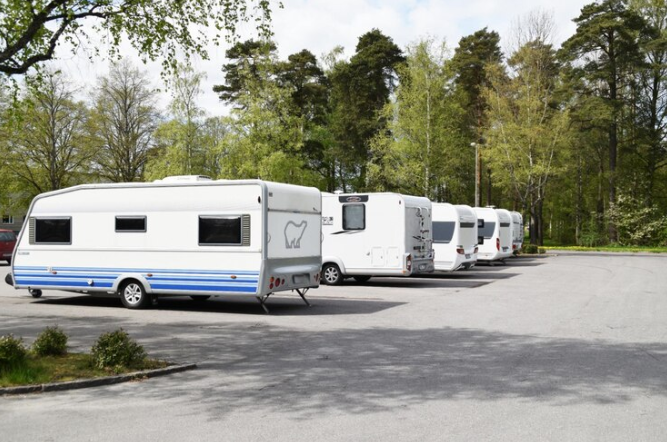The allure of the open road, the freedom to travel at your own pace, and the comfort of having your own space—these are some reasons recreational vehicles (RVs) have become popular for travelers. Whether you’re planning a weekend getaway or a cross-country adventure, there’s an RV to suit every lifestyle and budget.
However, to get the best experience, you must understand the different types of RVs, their features, and their pros and cons. This can help you determine which one might be the best fit for you.

What Are the Different Types of RVs?
1. Travel Trailers
Travel trailers are among the most versatile and popular RVs. They come in various sizes, from compact models perfect for two people to large units that can accommodate an entire family. Travel trailers are towed by a vehicle with a hitch, making them easy to detach and set up at your campsite.
Key Features:
- Sleeping Areas: These can include bunk beds, convertible sofas, and master bedrooms.
- Kitchens: Equipped with stoves, microwaves, refrigerators, and ample storage.
- Bathrooms: Typically feature showers, toilets, and sinks.
- Storage: Plenty of cabinets and closets for all your gear and essentials.
- Slide-Outs: Expand the living space when parked.
- Stabilizer Jacks: Help level the trailer at the campsite.
| Pros | Cons |
|
|
2. Fifth Wheels
Fifth wheels are a type of travel trailer that attaches to a special hitch in the bed of a pickup truck. This design offers a more stable and secure towing experience. Fifth wheels are known for spacious interiors and often include multiple slide-outs to maximize living space.
Key Features:
- Master Bedrooms: Often located in the raised front section.
- Bathrooms: Typically larger, with residential-style amenities.
- Kitchens: Full-size appliances and plenty of counter space.
- Storage: Ample storage, including walk-in closets and large pantries.
- Slide-Outs: Enhance the interior living space.
- Large Awnings: Extend your outdoor living area.
- Basement Storage: Provides additional storage space underneath the RV.
| Pros | Cons |
|
|
3. Lightweight RVs
Lightweight RVs are designed for ease of towing and fuel efficiency. They are often smaller and built with lighter materials, making them ideal for those who want to travel light. Despite their size, they offer a surprising amount of comfort and amenities.
Key Features:
- Compact Kitchens: Efficiently designed with necessary appliances.
- Bathrooms: Small but functional with basic amenities.
- Living Areas: Convertible furniture to maximize space.
- Lightweight Construction: Easier to tow and more fuel-efficient.
- Aerodynamic Design: Improves towing stability and fuel economy.
- Easy Setup: Simplified setup process compared to larger RVs.
| Pros | Cons |
|
|
4. Toy Haulers
Toy haulers are designed to transport recreational vehicles like ATVs, motorcycles, and bikes. They feature a garage area in the rear that can be used for storage or converted into additional living space.
Key Features:
- Garage Area: Doubles as storage and living space.
- Flexible Sleeping Arrangements: Drop-down beds and fold-out furniture.
- Durable Flooring: Designed to withstand heavy use.
- Ramp Door: Easy loading and unloading of vehicles.
- Reinforced Construction: Built to handle the extra weight of vehicles.
- Outdoor Awning: Expands living space outdoors.
| Pros | Cons |
|
|
5. Pop-up Campers
Pop-up campers, known as tent trailers, are compact and lightweight RVs that expand to provide more living space. They are easy to tow and set up, making them a popular choice for weekend campers and those new to RVs.
Key Features:
- Sleeping Areas: Expandable sleeping spaces.
- Compact Kitchens: Basic cooking facilities.
- Simple Bathrooms: Some models include basic bathroom facilities.
- Expandable Sections: Provide additional space when set up.
- Lightweight: Easy to tow with smaller vehicles.
- Easy Setup: Quick and straightforward to set up and take down.
| Pros | Cons |
|
|
6. Tiny Travel Trailers
Tiny travel trailers, or teardrop trailers, are small, lightweight, and aerodynamic. They are easy to tow and offer basic amenities, making them perfect for minimalists and those who enjoy a more rustic camping experience.
Key Features:
- Sleeping Area: Usually includes a compact bed.
- Kitchen: Often a small kitchenette or outdoor cooking area.
- Ventilation: Windows and fans for airflow.
- Compact Design: Maximizes the use of limited space.
- Aerodynamic Shape: Enhances towing efficiency.
- Lightweight: Easy to tow with most vehicles.
- Simple Setup: Quick and easy to set up at campsites.
| Pros | Cons |
|
|
7. Truck Campers
Truck campers fit into the bed of a pickup truck. They are compact, versatile, and ideal for exploring off-the-beaten-path destinations. Truck campers provide the flexibility of having a fully functional RV while retaining the ability to navigate rough terrain and tight spots.
Key Features:
- Sleeping Area: Usually includes a bed over the cab.
- Compact Kitchen: Equipped with a stove, sink, and small refrigerator.
- Bathroom: Some models include wet baths with a shower and toilet.
- Seating: Small dinette that often converts into additional sleeping space.
- Compact Size: Fits within the truck bed, making it easy to drive and park.
- Sturdy Construction: Designed to withstand rugged conditions.
- Detachable: Can be detached from the truck for more flexibility.
| Pros | Cons |
|
|
8. Class A Motorhomes
Class A motorhomes are the largest and most luxurious RVs, built on a bus chassis. They offer unparalleled comfort and amenities, making them ideal for long-term travel and full-time living. These motorhomes are often equipped with high-end finishes and state-of-the-art technology.
Key Features:
- Master Bedrooms: Spacious with residential-style beds.
- Bathrooms: Often include large showers, toilets, and double sinks.
- Living Areas: Luxurious with sofas, recliners, and entertainment systems.
- Storage: Extensive storage options, including large closets and basement compartments.
- Slide-Outs: Multiple slide-outs to expand living space.
- Large Awnings: Extend outdoor living space.
- Basement Storage: Provides significant additional storage space.
| Pros | Cons |
|
|
9. Class B Motorhomes
Class B motorhomes, or camper vans, are built on a van chassis and offer a compact, self-contained living space. They are easy to drive and park, making them ideal for urban exploration and short trips.
Key Features:
- Sleeping Area: Usually includes a convertible bed.
- Living Space: Convertible seating and dining areas.
- Storage: Efficiently designed storage compartments.
- Compact Size: Easy to drive and park in standard parking spaces.
- Fuel Efficient: More fuel-efficient than larger motorhomes.
- Stealthy Design: Can blend in with regular vehicles.
| Pros | Cons |
|
|
10. Class C Motorhomes
Class C motorhomes are built on a truck or van chassis. They are characterized by their over-cab sleeping area. They offer a balance between the space and amenities of a Class A motorhome and the maneuverability of a Class B. Class C motorhomes are ideal for families.
Key Features:
- Over-Cab Sleeping Area: Provides additional sleeping space.
- Full Kitchen: Includes stove, microwave, sink, and refrigerator.
- Storage: Ample storage, including cabinets and exterior compartments.
- Slide-Outs: Expand living space when parked.
- Large Awnings: Extend outdoor living space.
- Basement Storage: Offers additional storage space.
| Pros | Cons |
|
|
Shop at Basic Components for Products and Supplies for Your RV or Motorhome
Embarking on the RV lifestyle is an exciting adventure filled with endless possibilities. By understanding the different types of RVs and considering your needs and preferences, you can find the perfect RV to make your travel dreams a reality.
At Basic Components, we have over 30 years of experience supplying products needed to maintain or upgrade RVs, motorhomes, travel trailers, and more. We offer nationwide delivery for all your needs. Order your products at Basic Components today.

